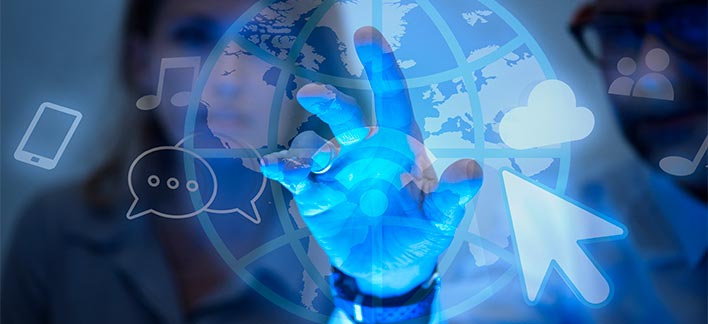
August 6th, World Wide Web Anniversary
What to expect from the future, 30 years after the creation of the World Wide Web
By 2025, most of the world's population will have moved from almost complete lack of access to information to mastering the entire world's information through a palm-sized device. If the current pace of technological innovation is maintained, most of Earth's estimated eight billion people will be online.
The prediction for the future is right at the opening of the book The New Digital Age, written by Eric Schmidt, Google's chairman, and Jared Cohen, the company's director of ideas. In the publication, the pair makes estimates - not always optimistic - about how the future of people, nations and businesses will be.
With so many people online in the world at the same time, experts predict that many significant and profound changes are yet to come in the job market, inside our home, in the business world, in relationships between people, in nature ... in short, in all areas of life. Yes, the Internet impacts almost every particle on the planet, to a greater or lesser extent.
WHAT WAS IT LIKE BEFORE THE INTERNET?
Do you remember how long it took us to complete a banking transaction? And to look for information for a school research? And when you had to consult a paper guide with hundreds of maps to find an address and how to get to it? Nowadays, we just use apps that map directions in seconds to get you somewhere. And if you don't want to type, just give a voice command and say the address. While in the 1980s students had to open heavy books and flip through hundreds of pages to search for information in encyclopedias, we currently only take milliseconds to find any data anywhere in the world on any subject. And this whole change took a few decades to take place!
On the other hand, it is worth remembering that some old habits bring us a healthy nostalgia. Only those who have received a handwritten letter from their loved one, now replaced by instant messaging, know the thrill it was. Or the joy of listening to vinyl records and singing along with the lyrics that came with the cover of the LP.
Time saving is one of the great legacies that the Internet and technological advances have brought us. Technology has simplified and shortened processes and operations and thus made everything faster and more automatic. Customers of Neoenergia Group distributors, for example, can pay the electricity bill within minutes using the app, or even request the duplicate bill, reconnect energy and consult consumption history, easily, quick and safe.
Neonergia also invests constantly in Research and Development (R&D) to broaden knowledge and apply these studies in the development of new or technologically enhanced products or processes. Each year, our company has about R$25 million for these investments, which meets the guidelines of the Research and Technological Development Program of the Electric Energy Sector, of the National Electric Energy Agency (Aneel). These investments are in line with UN Sustainable Development Goals (SDGs) Objective 9, which provides for “Building resilient infrastructure, promoting inclusive and sustainable industrialization and fostering innovation". The SDGs are part of a global agenda adopted during the United Nations Summit on Sustainable Development in 2015, consisting of 17 goals and 169 objectives to be achieved by 2030 by various countries.
THE WEB ORIGIN
The World Wide Web is celebrating its 30th anniversary. Known to everyone as the WWW, the arrival of the web has revolutionized the Internet and made access to it democratic and affordable.
In 1989, after long years of study, English engineer and computer scientist Tim Berners-Lee completed the protocol that houses websites today and would forever change the way we communicate, consume, and inform ourselves. As defined by a report of Exame magazine, the web is the space through which information - text, images, videos, audios - circulates in the form of URLs (addresses), while the Internet is “just" a networked computer system. It may exist without the WWW, but the WWW could not exist without the Internet, which was created in the 1960s, about 20 years before WWW, in the United States, to interconnect research laboratories.
INTERNET REACHES THREE OUT OF FOUR HOMES IN BRAZIL
According to the National Household Sample Survey (PNAD Contínua TIC 2017), 74.9% of households in the country have access to the Internet. And among 181.1 million people aged 10 years or older, 69.8% accessed the Internet at least once in the three months prior to the survey. Most are between 20 and 24 years old (88.4%).
BRAZILIAN PEOPLE SPEND MORE THAN NINE HOURS A DAY ON THE INTERNET
Brazil is the second country in the world to spend more time a day on the web, just behind the Philippines. The Brazilian Internet user is on average nine hours and 29 minutes a day connected, while the Philippine, ten hours and two minutes. Third is the Thai, who spend an average of nine hours and 11 minutes a day connected to the Internet. Data from relatório about the Internet in Brazil and the world in 2018, made by Data Reportal and with data from the We Are Social agency and the Hootsuite platform.
Benefit from the theme to reflect how the Internet has changed your daily life and how to use it to gain quality of life. It is worth remembering that the virtual world, like that of social networks, is very rich and interesting, but that real life and presence is essential to strengthen human relations.
News
2025-04-25
Ilumina Social: Instituto Neoenergia lança pela primeira vez edital com foco em saúde e bem-estar
2025-04-22
Neoenergia vende 50% de Itabapoana Transmissão
2025-04-15
Nova campanha da Neoenergia celebra a potência feminina no esporte e reforça apoio às atletas embaixadoras da marca
2025-03-27
Instituto Neoenergia lança chamada inédita unificada de editais para apoiar projetos sociais
2025-03-21
